Family dictatorship
A family dictatorship, or hereditary dictatorship, in political science terms a personalistic regime, is a form of dictatorship that occurs in a nominally or formally republican or socialist regime, but operates in practice like an absolute monarchy or despotate, in that political power passes within the dictator's family like a hereditary monarchy. Thus, although the key leader is often called president or prime minister rather than a king or emperor, power is transmitted between members of the same family due to the overwhelming authority of the leader. Sometimes the leader has been declared president for life and uses this power to nominate one of his or her family as successor.
A family dictatorship is different from a monarchy (where the descent is required by general constitutional law), or a political family (where members of the family possess informal, rather than formal and overwhelming political authority).
Distinguishing features
A family dictatorship is different from an absolute monarchy, and the ruler does not usually base his or her authority on the concept of divine right. In the latter, the transition of power within a family is required by general law as part of the state's constitutional arrangement, and continues to apply to all successions in the regime. In the former, this arrangement is not required by general law. In some cases, a special law might be enacted to formally nominate one particular family member of the present leader as the successor. In other cases, the law of the state may even formally provide for elections, but control exerted by the leader on the political and electoral process ensures a hereditary succession. Furthermore, whether each succession succeeds depends on the level of authority and control of the leader. As a result, modern family dictatorships often transition into a non-familial (non-personalistic) regime after a small number of successions: usually just one, and rarely more than two.
A family dictatorship is also different from other political families. In the latter, informal power and influence accrued to the family enables the family to continue to hold political power, often through open and contested elections. In the former, the family uses either formal legal or political power or control to ensure a familial succession, and usually via a controlled or uncontested election, or no election at all.
Because a family dictatorship exerts significant control on its succession, a successor is often determined well in advance. However, because it often lacks a formal general law basis for the succession, there are often long periods of uncertainty as to the identity of the successor. As often happens in other types of totalitarian regimes which plan their own succession, after a successor is determined or short-listed, they often go through a significant period of "grooming", in which the successor gains the experiences and qualifications aimed to make him or her attain the authority necessary to lead the regime.
Successful transitions of power
Dates in parentheses denote the period of rule.
Europe
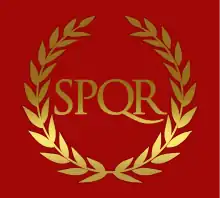 Roman Republic: Gaius Julius Caesar (49–44 BCE) succeeded by his grand-nephew and adopted son Gaius Julius Caesar Octavianus (44–27 BCE).
Roman Republic: Gaius Julius Caesar (49–44 BCE) succeeded by his grand-nephew and adopted son Gaius Julius Caesar Octavianus (44–27 BCE). Roman Empire: The early dynasties of the Roman Empire operated similarly to a family dictatorship. Augustus (27 BCE–14 CE) kept up the facade of a republic during his reign but designated his own successor, Tiberius, by adopting Tiberius and convincing the Senate to transfer his powers to Tiberius (14 CE–37 CE) upon his death. For three hundred years, subsequent emperors customarily designated their successor by adoption. From the reign of Diocletian (284–305) onwards, emperors ruled in an openly monarchic style.
Roman Empire: The early dynasties of the Roman Empire operated similarly to a family dictatorship. Augustus (27 BCE–14 CE) kept up the facade of a republic during his reign but designated his own successor, Tiberius, by adopting Tiberius and convincing the Senate to transfer his powers to Tiberius (14 CE–37 CE) upon his death. For three hundred years, subsequent emperors customarily designated their successor by adoption. From the reign of Diocletian (284–305) onwards, emperors ruled in an openly monarchic style. Dutch Republic: Stadtholders were chosen exclusively from the House of Orange-Nassau. In all, nine princes of this dynasty ruled the Republic from 1559 to 1795. Stadtholders were described as dictators by William Aglionby in his 1669 book, The Present State of the United Provinces of the Low-Countries.[1]
Dutch Republic: Stadtholders were chosen exclusively from the House of Orange-Nassau. In all, nine princes of this dynasty ruled the Republic from 1559 to 1795. Stadtholders were described as dictators by William Aglionby in his 1669 book, The Present State of the United Provinces of the Low-Countries.[1].svg.png.webp) The Protectorate: Oliver Cromwell (1653–1658) succeeded as Lord Protector by his son Richard Cromwell (1658–1659). Richard Cromwell was overthrown by the army in Spring 1659, leading to the restoration of King Charles II the next year.
The Protectorate: Oliver Cromwell (1653–1658) succeeded as Lord Protector by his son Richard Cromwell (1658–1659). Richard Cromwell was overthrown by the army in Spring 1659, leading to the restoration of King Charles II the next year.
Central and South America
.svg.png.webp) Paraguay: Carlos Antonio López (President, 1840–1862); succeeded by his son, Francisco Solano López (1862–1870)
Paraguay: Carlos Antonio López (President, 1840–1862); succeeded by his son, Francisco Solano López (1862–1870)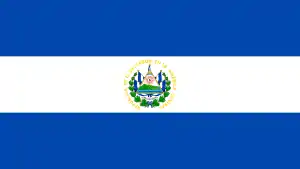 El Salvador: Carlos Meléndez (President, 1915–1918), succeeded by his brother Jorge Meléndez (1919–1923), succeeded by his brother-in-law Alfonso Quiñónez Molina (acting 1918–1919, 1923–1927)
El Salvador: Carlos Meléndez (President, 1915–1918), succeeded by his brother Jorge Meléndez (1919–1923), succeeded by his brother-in-law Alfonso Quiñónez Molina (acting 1918–1919, 1923–1927)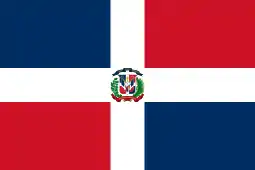 Dominican Republic: Rafael Trujillo (de facto 1930–1961, with brother Héctor serving as figurehead president 1952–1960), nominally succeeded by his son Ramfis Trujillo for a few months in 1961; Ramfis failed to fully consolidate his power over the country and was overthrown.
Dominican Republic: Rafael Trujillo (de facto 1930–1961, with brother Héctor serving as figurehead president 1952–1960), nominally succeeded by his son Ramfis Trujillo for a few months in 1961; Ramfis failed to fully consolidate his power over the country and was overthrown..svg.png.webp) Nicaragua: Anastasio Somoza García (President, 1937–1947, de facto 1947–1950, 1950–1956), succeeded by his son Luis Somoza Debayle (1956–1963, de facto 1963–1967), succeeded by his brother Anastasio Somoza Debayle (1967–1972, de facto 1972–1974, 1974–1979). See also Somoza family.
Nicaragua: Anastasio Somoza García (President, 1937–1947, de facto 1947–1950, 1950–1956), succeeded by his son Luis Somoza Debayle (1956–1963, de facto 1963–1967), succeeded by his brother Anastasio Somoza Debayle (1967–1972, de facto 1972–1974, 1974–1979). See also Somoza family..svg.png.webp) Haiti: François Duvalier (President and later President For Life, 1957–1971); succeeded by his son Jean-Claude Duvalier (President For Life, 1971–1986). See also Duvalier dynasty.
Haiti: François Duvalier (President and later President For Life, 1957–1971); succeeded by his son Jean-Claude Duvalier (President For Life, 1971–1986). See also Duvalier dynasty.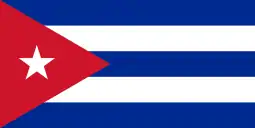 Cuba: Fidel Castro (1959–2011), succeeded by his brother Raúl Castro, current First Secretary of the Communist Party of Cuba (2011–present).
Cuba: Fidel Castro (1959–2011), succeeded by his brother Raúl Castro, current First Secretary of the Communist Party of Cuba (2011–present). Argentina: Juan Perón (President, 1972-1974) succeeded by his wife Isabel Martínez de Perón
Argentina: Juan Perón (President, 1972-1974) succeeded by his wife Isabel Martínez de Perón
Asia
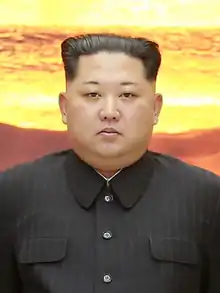
 Azerbaijan: Heydar Aliyev (President, 1993–2003); succeeded by his son Ilham Aliyev (2003–present).
Azerbaijan: Heydar Aliyev (President, 1993–2003); succeeded by his son Ilham Aliyev (2003–present).
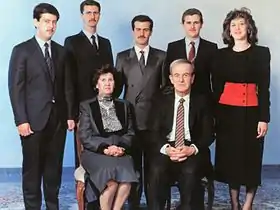
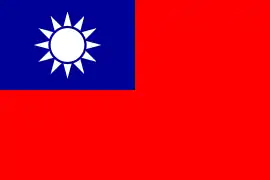 Republic of China (Taiwan): Chiang Kai-shek (1928–1975) succeeded by his son Chiang Ching-kuo (1975–1988)[lower-alpha 1]
Republic of China (Taiwan): Chiang Kai-shek (1928–1975) succeeded by his son Chiang Ching-kuo (1975–1988)[lower-alpha 1]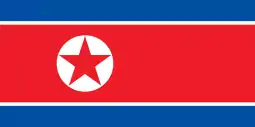 North Korea: Kim Il-sung (1948–1994), succeeded by his son Kim Jong-il (1994–2011), succeeded by his son Kim Jong-un (2011–present). Kim Jong-il did not officially take office until 1997, when his father was posthumously given the position of Eternal President. On 2 June 2009, it was reported that Kim Jong-il's youngest son, Kim Jong-un, was to be North Korea's next leader.[2] Like his father and grandfather, he was given an official sobriquet, The Great Successor and The Brilliant Comrade.[3] It was reported that Kim Jong-il was expected to officially designate the son as his successor in 2012,[4] but Kim Jong-il died in 2011 and Kim Jong-un was nevertheless announced as his successor.[5] The 2013 edition of the "Ten Fundamental Principles of the Korean Workers' Party" – Article 10, Clause 2 – states that the Party and Revolution must be carried "eternally" by the "Baekdu (Kim's) bloodline".[6] See also Kim Dynasty.
North Korea: Kim Il-sung (1948–1994), succeeded by his son Kim Jong-il (1994–2011), succeeded by his son Kim Jong-un (2011–present). Kim Jong-il did not officially take office until 1997, when his father was posthumously given the position of Eternal President. On 2 June 2009, it was reported that Kim Jong-il's youngest son, Kim Jong-un, was to be North Korea's next leader.[2] Like his father and grandfather, he was given an official sobriquet, The Great Successor and The Brilliant Comrade.[3] It was reported that Kim Jong-il was expected to officially designate the son as his successor in 2012,[4] but Kim Jong-il died in 2011 and Kim Jong-un was nevertheless announced as his successor.[5] The 2013 edition of the "Ten Fundamental Principles of the Korean Workers' Party" – Article 10, Clause 2 – states that the Party and Revolution must be carried "eternally" by the "Baekdu (Kim's) bloodline".[6] See also Kim Dynasty.%253B_Flag_of_Syria_(1963%E2%80%931972).svg.png.webp) Iraq: Abdul Salam Arif (President, 1963–1966); succeeded by his brother Abdul Rahman Arif (1966–1968).
Iraq: Abdul Salam Arif (President, 1963–1966); succeeded by his brother Abdul Rahman Arif (1966–1968). Syria: Hafez al-Assad (1971–2000), succeeded by his son Bashar al-Assad (2000–present). Bashar's elder brother, Basil al-Assad, had been designated for the presidency but died in 1994, six years prior to his father's death. See also Al-Assad family.
Syria: Hafez al-Assad (1971–2000), succeeded by his son Bashar al-Assad (2000–present). Bashar's elder brother, Basil al-Assad, had been designated for the presidency but died in 1994, six years prior to his father's death. See also Al-Assad family.
Africa
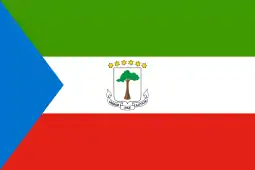 Equatorial Guinea: Teodoro Obiang Nguema Mbasogo (1979-present) overthrew his uncle Francisco Macías Nguema (President; 1968-1979) on a coup d'état.
Equatorial Guinea: Teodoro Obiang Nguema Mbasogo (1979-present) overthrew his uncle Francisco Macías Nguema (President; 1968-1979) on a coup d'état.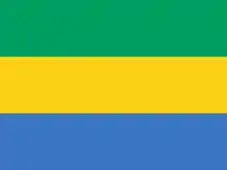 Gabon: Omar Bongo (Acting President, 1966–1967; President, 1967–2009) died in June 2009. His son Ali Bongo Ondimba (2009–present) succeeded him after winning a disputed election in August 2009.
Gabon: Omar Bongo (Acting President, 1966–1967; President, 1967–2009) died in June 2009. His son Ali Bongo Ondimba (2009–present) succeeded him after winning a disputed election in August 2009.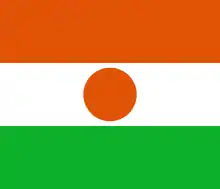 Niger: Seyni Kountché (President; 1974-1987) was succeeded by his cousin Ali Saibou (1987-1993) after his death.
Niger: Seyni Kountché (President; 1974-1987) was succeeded by his cousin Ali Saibou (1987-1993) after his death.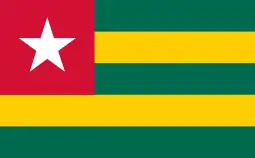 Togo: Gnassingbé Eyadéma (President, 1967–2005); succeeded by his son Faure Gnassingbé (2005–present). Under international pressure, Faure had to resign on 25 February 2005, but was elected to the presidency in April 2005.
Togo: Gnassingbé Eyadéma (President, 1967–2005); succeeded by his son Faure Gnassingbé (2005–present). Under international pressure, Faure had to resign on 25 February 2005, but was elected to the presidency in April 2005.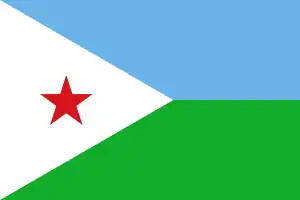 Djibouti: Hassan Gouled Aptidon (President, 1977–1999); succeeded by his nephew Ismaïl Omar Guelleh (1999–present).
Djibouti: Hassan Gouled Aptidon (President, 1977–1999); succeeded by his nephew Ismaïl Omar Guelleh (1999–present).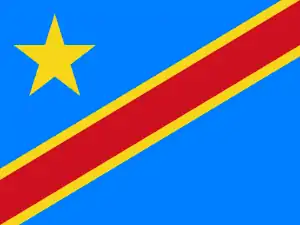 Democratic Republic of the Congo: Laurent-Désiré Kabila (President, 1997–2001); succeeded by his son Joseph Kabila (2001–2019). Joseph Kabila was democratically elected in October 2006.
Democratic Republic of the Congo: Laurent-Désiré Kabila (President, 1997–2001); succeeded by his son Joseph Kabila (2001–2019). Joseph Kabila was democratically elected in October 2006.
- Notes
- Chiang Ching-kuo was Premier 1972–1978 and Chairman of the Kuomintang 1975–1988.
Unfulfilled successions
.svg.png.webp) Hungary: Miklos Horthy (1920-1944) designated his son Istvan Horthy to succeed him as regent until Istvan was killed by accident in 1942.
Hungary: Miklos Horthy (1920-1944) designated his son Istvan Horthy to succeed him as regent until Istvan was killed by accident in 1942. Argentina: Juan Perón (President, 1946-1955) wanted his wife, Eva Perón to succeed him until her death in 1952
Argentina: Juan Perón (President, 1946-1955) wanted his wife, Eva Perón to succeed him until her death in 1952 China: After the death of Mao Zedong (1949–1976) his wife Jiang Qing planned a bloodless coup with the Gang of Four.
China: After the death of Mao Zedong (1949–1976) his wife Jiang Qing planned a bloodless coup with the Gang of Four.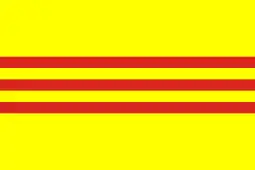 South Vietnam: Ngô Đình Diệm (Prime Minister, 1954–1955; President, 1955–1963) intended to hand power to his brother, Ngô Đình Nhu until both were arrested and assassinated during the 1963 coup.
South Vietnam: Ngô Đình Diệm (Prime Minister, 1954–1955; President, 1955–1963) intended to hand power to his brother, Ngô Đình Nhu until both were arrested and assassinated during the 1963 coup..svg.png.webp) Philippines: Ferdinand Marcos (1965–1986) intended his wife Imelda Marcos to be his successor but was ousted through the People Power Revolution.[7]
Philippines: Ferdinand Marcos (1965–1986) intended his wife Imelda Marcos to be his successor but was ousted through the People Power Revolution.[7]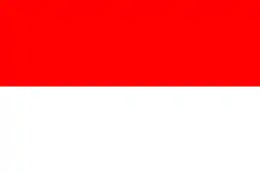 Indonesia: Suharto (President, 1967–1998) intended to hand power to his daughter, Siti Hardiyanti Rukmana or his son, Tommy Suharto to be his successor but the succession never happened as he resigned after the violent protest in 1998 that spread countrywide. He was later replaced by his vice-president B. J. Habibie[8][9]
Indonesia: Suharto (President, 1967–1998) intended to hand power to his daughter, Siti Hardiyanti Rukmana or his son, Tommy Suharto to be his successor but the succession never happened as he resigned after the violent protest in 1998 that spread countrywide. He was later replaced by his vice-president B. J. Habibie[8][9].svg.png.webp) Romania: Elena Ceaușescu, wife of Romanian dictator Nicolae Ceaușescu (President of the State Council, 1967–1989; President, 1974–1989), was intended to succeed her husband until they were executed during the 1989 Romanian Revolution.[10] Also, they were preparing their son, Nicu Ceausescu to succeed them.
Romania: Elena Ceaușescu, wife of Romanian dictator Nicolae Ceaușescu (President of the State Council, 1967–1989; President, 1974–1989), was intended to succeed her husband until they were executed during the 1989 Romanian Revolution.[10] Also, they were preparing their son, Nicu Ceausescu to succeed them..svg.png.webp) Libya: It was speculated that Saif al-Islam Gaddafi, the second son of then-leader Muammar Gaddafi (Brotherly Leader and Guide of the Revolution, 1969–2011) was going to succeed Gaddafi as leader, but Muammar was overthrown and Saif al-Islam stated that "this is not a farm to inherit".[11] Muammar Gaddafi's fourth son Mutassim Gaddafi was considered Saif al-Islam's strongest competitor in the question of succeeding their father.[12]
Libya: It was speculated that Saif al-Islam Gaddafi, the second son of then-leader Muammar Gaddafi (Brotherly Leader and Guide of the Revolution, 1969–2011) was going to succeed Gaddafi as leader, but Muammar was overthrown and Saif al-Islam stated that "this is not a farm to inherit".[11] Muammar Gaddafi's fourth son Mutassim Gaddafi was considered Saif al-Islam's strongest competitor in the question of succeeding their father.[12]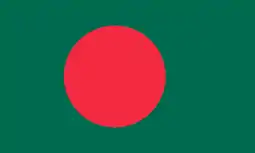 Bangladesh: Bangabandhu Sheikh Mujibur Rahman, the first President of Bangladesh (1971–1975), expected his son Sheikh Kamal to succeed him. Both were assassinated in 1975.
Bangladesh: Bangabandhu Sheikh Mujibur Rahman, the first President of Bangladesh (1971–1975), expected his son Sheikh Kamal to succeed him. Both were assassinated in 1975.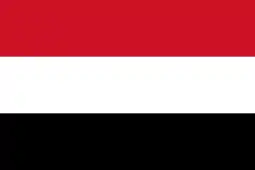 Yemen: In 2004, Ali Abdullah Saleh (President of North Yemen then President of unified Yemen, 1978–2012) appointed his son, Ahmed Saleh, as commander of the Yemeni Republican Guard – a move interpreted by analysts as designating a family succession. Amid the Yemeni Revolution in 2012 and shortly after being elected president, Abdrabbuh Mansur Hadi dissolved the Republican Guard, effectively removing Ahmed Saleh from any meaningful power.
Yemen: In 2004, Ali Abdullah Saleh (President of North Yemen then President of unified Yemen, 1978–2012) appointed his son, Ahmed Saleh, as commander of the Yemeni Republican Guard – a move interpreted by analysts as designating a family succession. Amid the Yemeni Revolution in 2012 and shortly after being elected president, Abdrabbuh Mansur Hadi dissolved the Republican Guard, effectively removing Ahmed Saleh from any meaningful power..svg.png.webp) Iraq: Saddam Hussein (de facto 1979–2003) designated his elder son Uday Hussein to succeed him as dictator, then changed the succession to his younger son Qusay Hussein after Uday suffered a severe injury in 1996. The U.S. invasion of Iraq and the death of both his sons, followed by Saddam's trial and subsequent execution made a successor irrelevant. See also Saddam's family.
Iraq: Saddam Hussein (de facto 1979–2003) designated his elder son Uday Hussein to succeed him as dictator, then changed the succession to his younger son Qusay Hussein after Uday suffered a severe injury in 1996. The U.S. invasion of Iraq and the death of both his sons, followed by Saddam's trial and subsequent execution made a successor irrelevant. See also Saddam's family.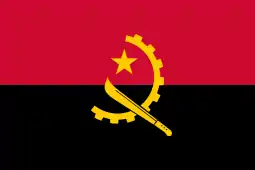 Angola: In 2010, José Eduardo dos Santos (President, 1979–2017) appointed his cousin Fernando da Piedade Dias dos Santos as Vice-President of Angola which opened speculation about a succession. However, in 2012, the ruling People's Movement for the Liberation of Angola announced President dos Santos' candidacy for re-election instead, because he had no intention to retire until 2017, when João Lourenço was chosen to succeed him instead.[13]
Angola: In 2010, José Eduardo dos Santos (President, 1979–2017) appointed his cousin Fernando da Piedade Dias dos Santos as Vice-President of Angola which opened speculation about a succession. However, in 2012, the ruling People's Movement for the Liberation of Angola announced President dos Santos' candidacy for re-election instead, because he had no intention to retire until 2017, when João Lourenço was chosen to succeed him instead.[13]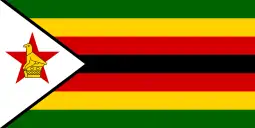 Zimbabwe: Robert Mugabe (Prime Minister then President, 1980–2017) wanted his wife Grace to succeed him,[14][15][16] but this was prevented by a military coup.
Zimbabwe: Robert Mugabe (Prime Minister then President, 1980–2017) wanted his wife Grace to succeed him,[14][15][16] but this was prevented by a military coup. Malaysia: Mahathir Mohamad (Prime Minister, 1981–2003; 2018–2020) once told the high court that he would have made his son, Mukhriz Mahathir, head of government long ago, but this never happened as Mahathir chose Anwar Ibrahim as his successor later.[17]
Malaysia: Mahathir Mohamad (Prime Minister, 1981–2003; 2018–2020) once told the high court that he would have made his son, Mukhriz Mahathir, head of government long ago, but this never happened as Mahathir chose Anwar Ibrahim as his successor later.[17] Egypt: Hosni Mubarak (President, 1981–2011) groomed his son Gamal Mubarak to become his successor, but was ousted in the 2011 Egyptian revolution.[18]
Egypt: Hosni Mubarak (President, 1981–2011) groomed his son Gamal Mubarak to become his successor, but was ousted in the 2011 Egyptian revolution.[18]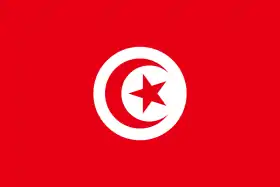 Tunisia: It was speculated that either Leïla Ben Ali, the wife of Zine El Abidine Ben Ali (President of Tunisia, 1987–2011),[19][20][21][22] or their youngest son Mohamed Zine el-Abidine Ben Ali[23][24][20] were going to succeed Ben Ali, until the Ben Ali family fled into exile amid the 2011 Tunisian Revolution.
Tunisia: It was speculated that either Leïla Ben Ali, the wife of Zine El Abidine Ben Ali (President of Tunisia, 1987–2011),[19][20][21][22] or their youngest son Mohamed Zine el-Abidine Ben Ali[23][24][20] were going to succeed Ben Ali, until the Ben Ali family fled into exile amid the 2011 Tunisian Revolution.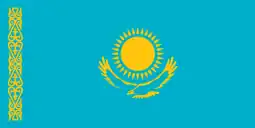 Kazakhstan: Analysts believed long-time leader Nursultan Nazarbayev (President, 1991–2019) had been preparing his daughter Dariga Nazarbayeva to succeed him. Despite a strained relationship during 2013;[25] in September 2016, Dariga was appointed to the Senate – she was designated as head of the Senate's International Affairs, Defense, and Security Committee.[26] On 19 March 2019, Nazarbayev resigned as president and was succeeded by Qasym-Zhomart Toqaev. Following Nursultan's resignation, Dariga was elected Chairwoman of the Senate leading some analysts to believe she would run for president in the scheduled 2020 election.[27][28] Dariga chose to not run in the snap June 2019 presidential election.
Kazakhstan: Analysts believed long-time leader Nursultan Nazarbayev (President, 1991–2019) had been preparing his daughter Dariga Nazarbayeva to succeed him. Despite a strained relationship during 2013;[25] in September 2016, Dariga was appointed to the Senate – she was designated as head of the Senate's International Affairs, Defense, and Security Committee.[26] On 19 March 2019, Nazarbayev resigned as president and was succeeded by Qasym-Zhomart Toqaev. Following Nursultan's resignation, Dariga was elected Chairwoman of the Senate leading some analysts to believe she would run for president in the scheduled 2020 election.[27][28] Dariga chose to not run in the snap June 2019 presidential election..svg.png.webp) Myanmar: There are some sources that stated Nay Shwe Thway Aung, the favourite grandson of former military leader Than Shwe (Chairman of the State Peace and Development Council, 1992-2011) was given military high rank despite never actually served in the military. The move created speculation that Nay Shwe Thway Aung was the next in line to succeed his grandfather rule. However the succession never happened as Myanmar was returned to democracy in 2011.[29][30][31][32]
Myanmar: There are some sources that stated Nay Shwe Thway Aung, the favourite grandson of former military leader Than Shwe (Chairman of the State Peace and Development Council, 1992-2011) was given military high rank despite never actually served in the military. The move created speculation that Nay Shwe Thway Aung was the next in line to succeed his grandfather rule. However the succession never happened as Myanmar was returned to democracy in 2011.[29][30][31][32].svg.png.webp) Venezuela: It was speculated that Adán Chávez, the brother of then-leader Hugo Chávez (President, 1999–2013) was going to succeed Chávez as president, but this never happened. There was also speculation that one of Hugo Chávez's daughters, Maria Gabriela or Rosa Virginia, would succeed him.[33]
Venezuela: It was speculated that Adán Chávez, the brother of then-leader Hugo Chávez (President, 1999–2013) was going to succeed Chávez as president, but this never happened. There was also speculation that one of Hugo Chávez's daughters, Maria Gabriela or Rosa Virginia, would succeed him.[33]
Potential successions
 Azerbaijan: The Vice President and First Lady of Azerbaijan Mehriban Aliyeva is widely considered to be in line to succeed her husband Ilham Aliyev as President of Azerbaijan. Analysts also believe that their daughters Leyla and Arzu are also being prepared as their father's or their mother's successors.[34] On 21 February 2017 Mehriban Aliyeva was appointed Vice President of Azerbaijan, an office that was created through a constitutional referendum in 2016.[35]
Azerbaijan: The Vice President and First Lady of Azerbaijan Mehriban Aliyeva is widely considered to be in line to succeed her husband Ilham Aliyev as President of Azerbaijan. Analysts also believe that their daughters Leyla and Arzu are also being prepared as their father's or their mother's successors.[34] On 21 February 2017 Mehriban Aliyeva was appointed Vice President of Azerbaijan, an office that was created through a constitutional referendum in 2016.[35] Bangladesh: Sajeeb Wazed is widely regarded as the frontrunner to succeed his mother Prime Minister Sheikh Hasina. Even commentators who doubt his succession presume that a member of the Sheikh-Wazed family will take her place.[36][37][38]
Bangladesh: Sajeeb Wazed is widely regarded as the frontrunner to succeed his mother Prime Minister Sheikh Hasina. Even commentators who doubt his succession presume that a member of the Sheikh-Wazed family will take her place.[36][37][38]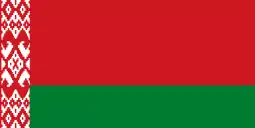 Belarus: It is rumored that President Alexander Lukashenko has been preparing to have his young son Nikolai succeed him.[39] Observers have noted how Lukashenko often brings his son on official engagements.[40] On some occasions Nikolai is given a chair with the other heads of state, in sharp contrast with, for instance, the children of the then-President of Uzbekistan Islam Karimov also present in the conference room.
Belarus: It is rumored that President Alexander Lukashenko has been preparing to have his young son Nikolai succeed him.[39] Observers have noted how Lukashenko often brings his son on official engagements.[40] On some occasions Nikolai is given a chair with the other heads of state, in sharp contrast with, for instance, the children of the then-President of Uzbekistan Islam Karimov also present in the conference room.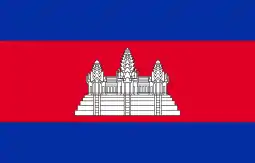 Cambodia: The Cambodian prime minister, Hun Sen, has appointed his eldest son, Hun Manet, to a higher military command to prepare him for the premiership.[41]
Cambodia: The Cambodian prime minister, Hun Sen, has appointed his eldest son, Hun Manet, to a higher military command to prepare him for the premiership.[41] Equatorial Guinea: On 3 August 1979, President Teodoro Obiang Nguema Mbasogo seized power from his uncle[42] Francisco Macías Nguema. It is rumored that his son, the First Vice President Teodoro Nguema Obiang Mangue, is his favorite to succeed him[43] (see also 2011 Equatorial Guinean constitutional referendum). However, it is suspected that a power struggle between the younger Teodoro and his uncle Armengol Ondo Nguema might occur after President Obiang's death.
Equatorial Guinea: On 3 August 1979, President Teodoro Obiang Nguema Mbasogo seized power from his uncle[42] Francisco Macías Nguema. It is rumored that his son, the First Vice President Teodoro Nguema Obiang Mangue, is his favorite to succeed him[43] (see also 2011 Equatorial Guinean constitutional referendum). However, it is suspected that a power struggle between the younger Teodoro and his uncle Armengol Ondo Nguema might occur after President Obiang's death.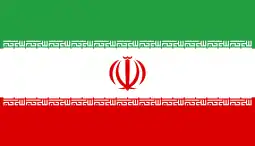 Iran: According to Iranian Journalist Momahad Ahwaze report, Iranian Supreme Leader Ali Khamenei is going to hand power to his son Sayyid Mojtaba Hosseini Khamenei, which said to be his favourite pick to be his successor due to his declining health.[44]
Iran: According to Iranian Journalist Momahad Ahwaze report, Iranian Supreme Leader Ali Khamenei is going to hand power to his son Sayyid Mojtaba Hosseini Khamenei, which said to be his favourite pick to be his successor due to his declining health.[44]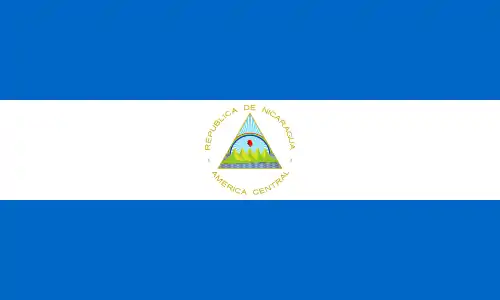 Nicaragua: On 10 January 2017, Rosario Murillo, wife of Nicaraguan president Daniel Ortega, was appointed as vice president of Nicaragua, which raised speculation that Murillo will succeed Ortega as president later.[45]
Nicaragua: On 10 January 2017, Rosario Murillo, wife of Nicaraguan president Daniel Ortega, was appointed as vice president of Nicaragua, which raised speculation that Murillo will succeed Ortega as president later.[45] North Korea: The sister of the Chairman of the WPK Kim Jong-un, Kim Yo-jong, had been removed from the Politburo, but became vice-member in April 2020, further fueling speculation about a possible successor. It is rumored that she takes over state business if he cannot run it for health reasons.[46][47] His daughter Kim Ju-ae as a formal successor as a puppet is also speculated in the event of his death.[48] Other candidates are said to be his brother Kim Jong-chul, his half-uncle Kim Pyong-il, and his wife Ri Sol-ju.[49][50]
North Korea: The sister of the Chairman of the WPK Kim Jong-un, Kim Yo-jong, had been removed from the Politburo, but became vice-member in April 2020, further fueling speculation about a possible successor. It is rumored that she takes over state business if he cannot run it for health reasons.[46][47] His daughter Kim Ju-ae as a formal successor as a puppet is also speculated in the event of his death.[48] Other candidates are said to be his brother Kim Jong-chul, his half-uncle Kim Pyong-il, and his wife Ri Sol-ju.[49][50] Russia: In July 2020, the great-nephew of President Vladimir Putin, Roman Putin, led the "People against Corruption" party.[51] Some media believe that this is preparation for the transfer of the presidency from uncle to nephew.[52]
Russia: In July 2020, the great-nephew of President Vladimir Putin, Roman Putin, led the "People against Corruption" party.[51] Some media believe that this is preparation for the transfer of the presidency from uncle to nephew.[52]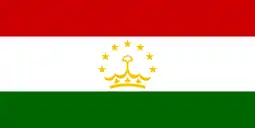 Tajikistan: On 3 April 2017, Rustam Emomali, the son of President Emomali Rahmon, was elected to the city legislature of the capital and largest city, Dushanbe. This made Rahmon's earlier appointment of Rustam Emomali as Mayor of Dushanbe legal. President Rahmon has other "close relatives" in "high official positions" in Tajikistan.[53][54] For example, Ozoda Rahmon, one of President Rahmon's daughters, is both her father's chief of the presidential staff and a member of the National Assembly, the upper house of the Tajik parliament.[55]
Tajikistan: On 3 April 2017, Rustam Emomali, the son of President Emomali Rahmon, was elected to the city legislature of the capital and largest city, Dushanbe. This made Rahmon's earlier appointment of Rustam Emomali as Mayor of Dushanbe legal. President Rahmon has other "close relatives" in "high official positions" in Tajikistan.[53][54] For example, Ozoda Rahmon, one of President Rahmon's daughters, is both her father's chief of the presidential staff and a member of the National Assembly, the upper house of the Tajik parliament.[55] Turkey: Some observers believe that especially since the shock of the 2016 coup attempt, President Recep Tayyip Erdoğan tends to trust his own family more than his party or senior bureaucrats.[56][57] A potential successor could be his son-in-law Berat Albayrak, who holds the influential post of finance minister and a seat on the Supreme Military Council.[58][59][60]
Turkey: Some observers believe that especially since the shock of the 2016 coup attempt, President Recep Tayyip Erdoğan tends to trust his own family more than his party or senior bureaucrats.[56][57] A potential successor could be his son-in-law Berat Albayrak, who holds the influential post of finance minister and a seat on the Supreme Military Council.[58][59][60]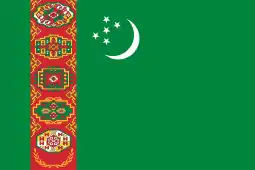 Turkmenistan: On 22 March 2017, the son of President Gurbanguly Berdimuhamedow, Assembly member[61] Serdar Berdimuhamedow, was appointed to chair the parliament's legal affairs committee – a move interpreted to be bringing Serdar closer to succeeding Gurbanguly.[62] On 2 January 2019, Serdar was appointed by his father, President Gurbanguly, as Deputy Governor of the Ahal region.[63] Serdar was elevated to Governor of the Ahal region on 17 June 2019.[64]
Turkmenistan: On 22 March 2017, the son of President Gurbanguly Berdimuhamedow, Assembly member[61] Serdar Berdimuhamedow, was appointed to chair the parliament's legal affairs committee – a move interpreted to be bringing Serdar closer to succeeding Gurbanguly.[62] On 2 January 2019, Serdar was appointed by his father, President Gurbanguly, as Deputy Governor of the Ahal region.[63] Serdar was elevated to Governor of the Ahal region on 17 June 2019.[64]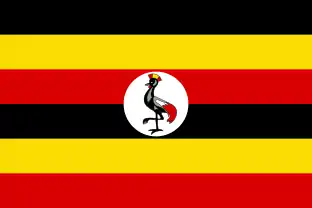 Uganda: Critics believe long-time president Yoweri Museveni has been preparing his son Muhoozi Kainerugaba to succeed him. The President's son was commander of Uganda's military elite Special Forces Group until January 2017 when the President appointed him Senior Adviser to the President for Special Operations, plus since 1998 Muhoozi has gone from the rank of Major to Lieutenant General in quick succession. All of this is leading the succession rumours to swell even more.
Uganda: Critics believe long-time president Yoweri Museveni has been preparing his son Muhoozi Kainerugaba to succeed him. The President's son was commander of Uganda's military elite Special Forces Group until January 2017 when the President appointed him Senior Adviser to the President for Special Operations, plus since 1998 Muhoozi has gone from the rank of Major to Lieutenant General in quick succession. All of this is leading the succession rumours to swell even more..svg.png.webp) Venezuela: There is a rumor that Nicolás Maduro Guerra, the son of Venezuelan leader Nicolás Maduro, is being prepared to succeed his father as Maduro Guerra was named in 2017 as the director of a newly created position, the Director General of Delegations and Presidential Instructions of the Vice President; the creation of which is believed to establish a line of succession.[65]
Venezuela: There is a rumor that Nicolás Maduro Guerra, the son of Venezuelan leader Nicolás Maduro, is being prepared to succeed his father as Maduro Guerra was named in 2017 as the director of a newly created position, the Director General of Delegations and Presidential Instructions of the Vice President; the creation of which is believed to establish a line of succession.[65]
Notes
- Aglionby, William A. (1669), The Present State of the United Provinces of the Low-Countries. John Starkey.
- North Korean leader Kim Jong-il 'names youngest son as successor', The Guardian, 2 June 2009
- "North Korea: A 'Brilliant Comrade'". The New York Times. 12 June 2009. Retrieved 13 June 2009.
- "Report: NKorea's Kim has pancreatic cancer", Associated Press, 12 July 2009.
- Fackler, Martin (2011-12-19). "Kim's Heir Likely to Focus on Stability". The New York Times. Retrieved 20 December 2011.
- The Twisted Logic of the N. Korean Regime, Chosun Ilbo, 2013-08-13, Accessed date: 2017-01-11
- The Steel Butterfly Still Soars. The New York Times. October 6, 2012.
- https://tirto.id/skenario-soeharto-untuk-memuluskan-tutut-jadi-presiden-cFo7
- https://m.cnnindonesia.com/nasional/20180312075352-32-282232/jatuh-bangun-tommy-soeharto-tegakkan-dinasti-politik-cendana
- https://www.romania-insider.com/recently-declassified-c-documents-show-ceausescu-succession-scenarios-romanias-economic-situation/amp/
- "Qaddafi's son declares he's leaving politics", Associated Press (International Herald Tribune), 22 August 2008.
- "Süddeutsche Zeitung am 12. Oktober 2011: Verwirrung um Festnahme von Gaddafi-Sohn Mutassim". Retrieved 2011-11-01.
- "Angolan president reshuffles govt after new charter", Reuters, 4 February 2010.
- "Mugabe - Vom Freiheitskämpfer zum Despoten". Welt. November 21, 2017. Retrieved 2018-08-04.
- "Sie flog auf Staatskosten zum Shoppen nach New York". Bild. November 16, 2017. Retrieved 2018-08-04.
- "Das Volk hungert, die First Lady shoppt". Der Tagesspiegel. September 1, 2017. Retrieved 2018-08-04.
- https://www.themalaysianinsight.com/s/40147
- Aziz, Muhammad Abdul and Hussein, Youssef (2002) "The President, the Son, and the Military: Succession in Egypt" Arab Studies Journal 9/10: pp. 73–88
- "Tunesien: Das Präsidenten-Gold", Abendzeitung), 17 Januar 2011.
- "In Tunesien nichts Neues - Die Wahlen vom 25. Oktober: Keine Überraschungen, aber Spekulationen über die „Zeit danach", Friedrich Ebert Foundation), Oktober 2009.
- "Tunesien – Eine Revolution und ihre Folgen", Konrad Adenauer Foundation), 4 April 2011.
- "Despot Housewives - Die Frauen der Diktatoren (1)", ZDF), 17 May 2011. (40:37)
- Karl Heinz Kunzmannde (2015). Diplomat in Peru und Tunesien: Ein Botschafter erzählt. ISBN 9783739266275.CS1 maint: multiple names: authors list (link)
- Muriel Mirak-Weißbach (2014). Herrschen bis der Frühling kommt: Profil der Machthaber in Tunesien, Ägypten, Jemen, Libyen und Syrien. ISBN 9783942223959.
- Kazakhstan: Apparent Rift Opens Within Nazarbaev Family. Radio Free Europe/Radio Liberty.
- "Kazakh president's daughter appointed head of Senate committee", Radio Free Europe/Radio Liberty, 16 September 2016.
- "Политологи назвали Даригу Назарбаеву будущим президентом Казахстана после "временного" Токаева". МК.ru (in Russian). Retrieved 2019-03-20.
- "Nursultan: Kazakhstan renames capital Astana after ex-president". BBC News. 20 March 2019. Retrieved 20 March 2019.
- "Than Shwe's Granddaughter Celebrates 4th Birthday with Rangoon Elite". The Irrawaddy. 8 December 2010.
- "ဖိုးလပြည့် (ခ) နေရွှေသွေးအောင် ပြောတဲ့ သူနဲ့သူ၏မေမေအကြောင်း". Cele Kabar (in Burmese). 20 April 2018. Retrieved 30 April 2018.
- "Myanmar's "Big State Secret"" (PDF). Global Witness. Retrieved 5 April 2018.
- Moe, Wai (14 March 2011). "Jealousies Divide 'United' Junta". The Irrawaddy.
- https://foreignpolicy.com/2012/05/04/venezuela-the-succession/
- Haley Sweetland Edwards, “AZERBAIJAN: WikiLeaks depicts lifestyles of Baku's rich and powerful”, Los Angeles Times, 25 Dec 2010, Accessed 26 Mar 2013
- Holding, APA Information Agency, APA (2017-02-21). "Mehriban Aliyeva appointed first vice-president of Azerbaijan". Archived from the original on 2017-09-04. Retrieved 2017-02-21.
- "Bangladesh – Family succession: After Sheikh Hasina". South Asia Journal. Retrieved 2020-10-20.
- "Leadership succession, terrorism, economy top themes at AL council". Dhaka Tribune. 2016-10-23. Retrieved 2020-10-20.
- "Sheikh Hasina is signalling a transition of leadership". www.telegraphindia.com. Retrieved 2020-10-20.
- Oliphant, Roland (11 October 2015). "Meet the pint-sized dictator: The 11-year-old heir groomed in North Korea-style dynasty for Belarus". The Daily Telegraph. Retrieved 31 July 2017.
- "Why does Belarus President Lukashenko take son Kolya to work?". BBC News. 1 October 2015. Retrieved 31 July 2017.
- "Cambodian strongman's son assumes powerful military role". Phnom Penh: The Straits Times. June 30, 2018. Retrieved 2018-07-11.
- "After the Mugabes, which African dynasties remain?". BBC News. 19 November 2017. Retrieved 19 November 2017.
- Johnson, RW (September 3, 2006). "Playboy waits for his African throne". London, Cape Town: Times Online. Retrieved 2010-05-05.
- Reich, Aaron (December 6, 2020). "Iran Supreme Leader Khamenei hands power to son due to health – report". The Jerusalem Post. Retrieved 2020-12-07.
- "Rosario Murillo Has Two Options to Follow Ortega in Nicaragua as President". confidencial.com.ni. July 28, 2016. Retrieved July 11, 2018.
- Piehler, Moritz (21 April 2020). "Spekulationen um Nordkoreas Führung: Wird sie die Nachfolgerin von Kim Jong-un?". Yahoo News. Retrieved 22 April 2020.
- Benninghoff, Martin (21 April 2020). "Wer könnte auf Kim Jong-un folgen?". Frankfurter Allgemeine Zeitung. Retrieved 22 April 2020.
- Steiner, Noelle (21 April 2020). "Kim Jong Un: So schlimm steht es um Nordkoreas Diktator". Nau. Retrieved 22 April 2020.
Gegebenenfalls könnte sogar die 7-jährige Tochter von Kim Jong Un als «Bauer» im ganzen Machtspiel eingesetzt werden, meint Ellis. So würde beispielsweise die Frau von Kim – Ri Sol Ju – auf den Thron gelangen.
- "Wirbel um Nordkorea-Machthaber: Welche Personen als mögliche Kim-Nachfolger gelten". Focus. 26 April 2020. Retrieved 26 April 2020.
- "Kim Jong Un's Successor Could Be His Uncle, Kim Pyong Il".
- Двоюродный племянник Путина стал главой партии «Народ против коррупции» // Статья от 05.07.2020 г. «РБК». М. Лисицына.
- «После Путина будет Путин». Племянник Путина получил свою партию // Статья от 06.07.2020 г. «Радио Свобода». А. Рудина.
- "Tajik President's Son Cements Mayoral Post With Election To Dushanbe Legislature". Radio Free Europe/Radio Liberty's Tajik Service. April 3, 2017. Retrieved April 4, 2017.
- "Daughter Of Tajik President Named Deputy Head Of Major Bank". Radio Free Europe/Radio Liberty's Tajik Service. July 18, 2017. Retrieved August 1, 2017.
- "Daughter Of Tajikistan's President Elected To Upper Chamber Of Parliament". Radio Free Europe/Radio Liberty's Tajik Service. May 29, 2016. Retrieved August 1, 2017.
- "Die Nachfolge Erdogans: alles bleibt in der Familie". Stuttgarter Nachrichten. July 18, 2018. Retrieved August 4, 2018.
- "Erdogans Macht soll in der Familie bleiben". Saarbrücker Zeitung. July 18, 2018. Retrieved August 4, 2018.
- "Bei den Erdogans bleibt alles in der Familie". Rheinische Post. July 23, 2018. Retrieved August 4, 2018.
- "Wie Erdogan seinen Schwiegersohn Albayrak zum Nachfolger aufbaut". Der Tagesspiegel. July 22, 2018. Retrieved August 4, 2018.
- "Zoff um Erdogan-Nachfolge? Die Türkei diskutiert über diesen Rempler". HuffPost. August 4, 2018. Retrieved August 4, 2018.
- "Turkmenistan President's Son Takes Post As Parliamentary Deputy". Radio Free Europe/Radio Liberty. Retrieved 3 June 2018.
- "Turkmen President's Son Becomes Senior Lawmaker In Parliament". Radio Free Europe/Radio Liberty. March 21, 2017. Retrieved March 22, 2017.
- "Turkmen President Hands Son Regional Deputy Governor's Post". Radio Free Europe/Radio Liberty. January 3, 2019. Retrieved January 11, 2019.
- "Turkmen President Names Son Provincial Governor". RFE/RL's Turkmen Service. 17 June 2019. Retrieved 18 June 2019.
- "El hijo de Nicolás Maduro se prepara para ser el sucesor de la revolución chavistar". La Información. Retrieved August 4, 2018.
